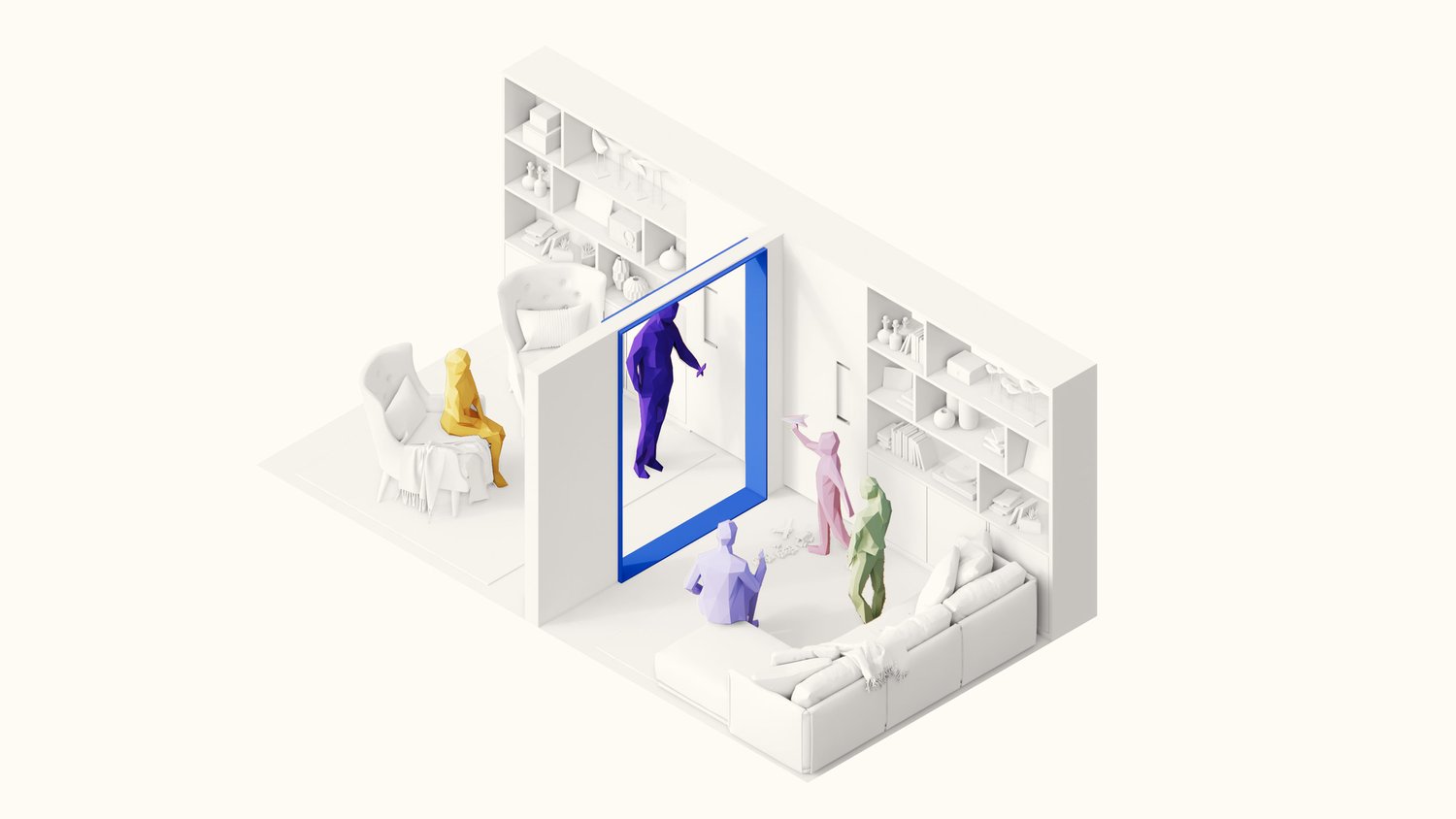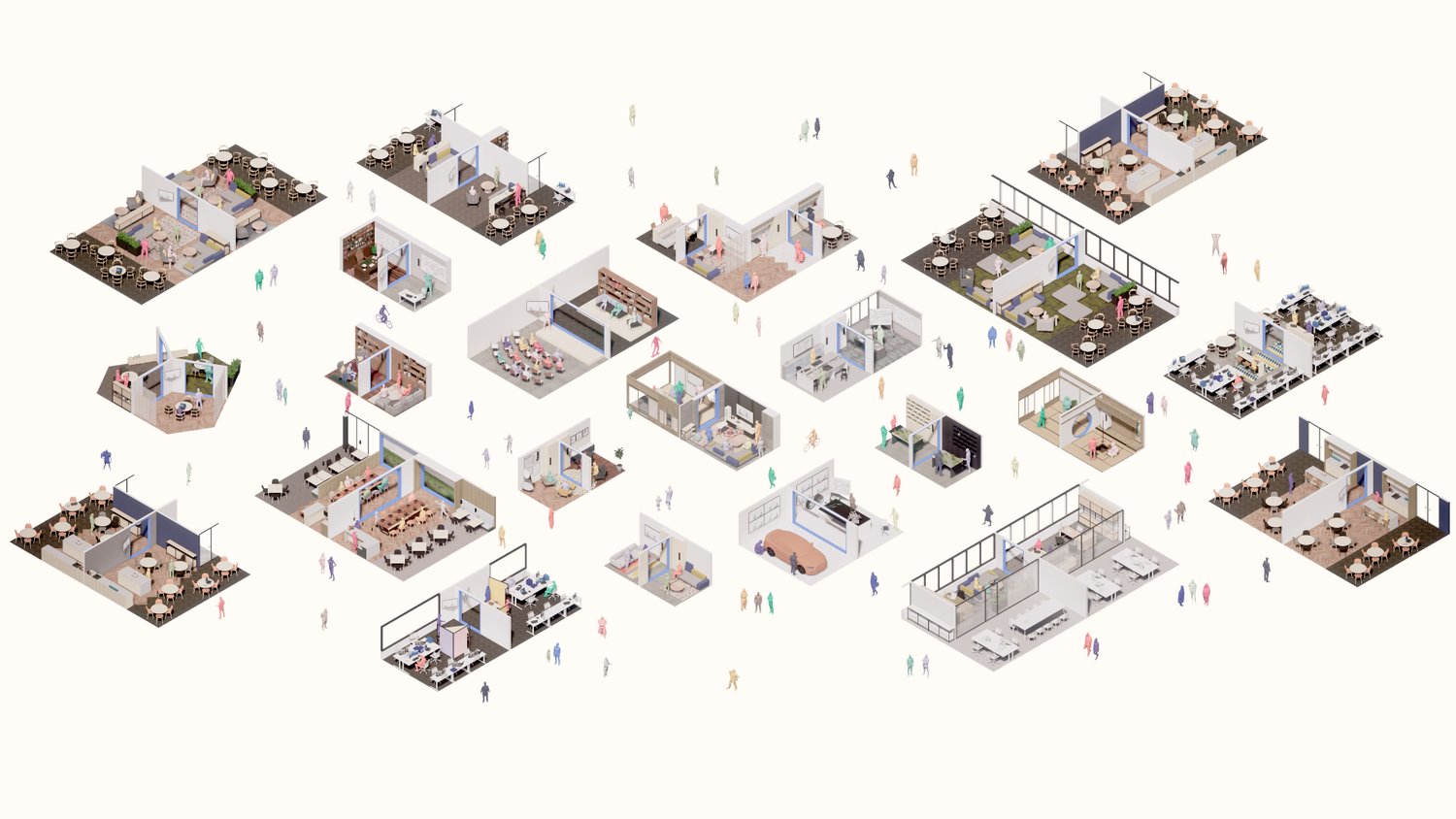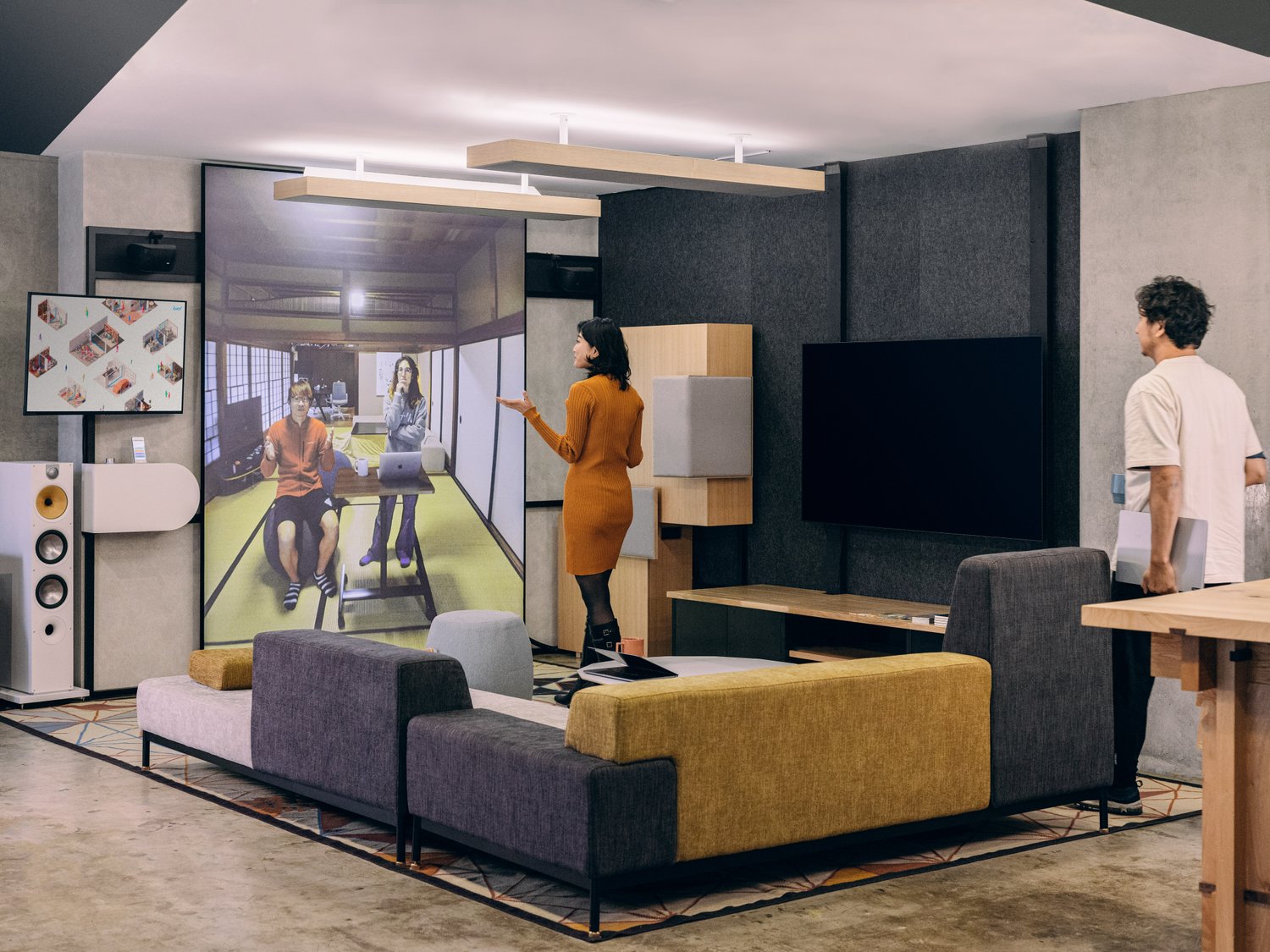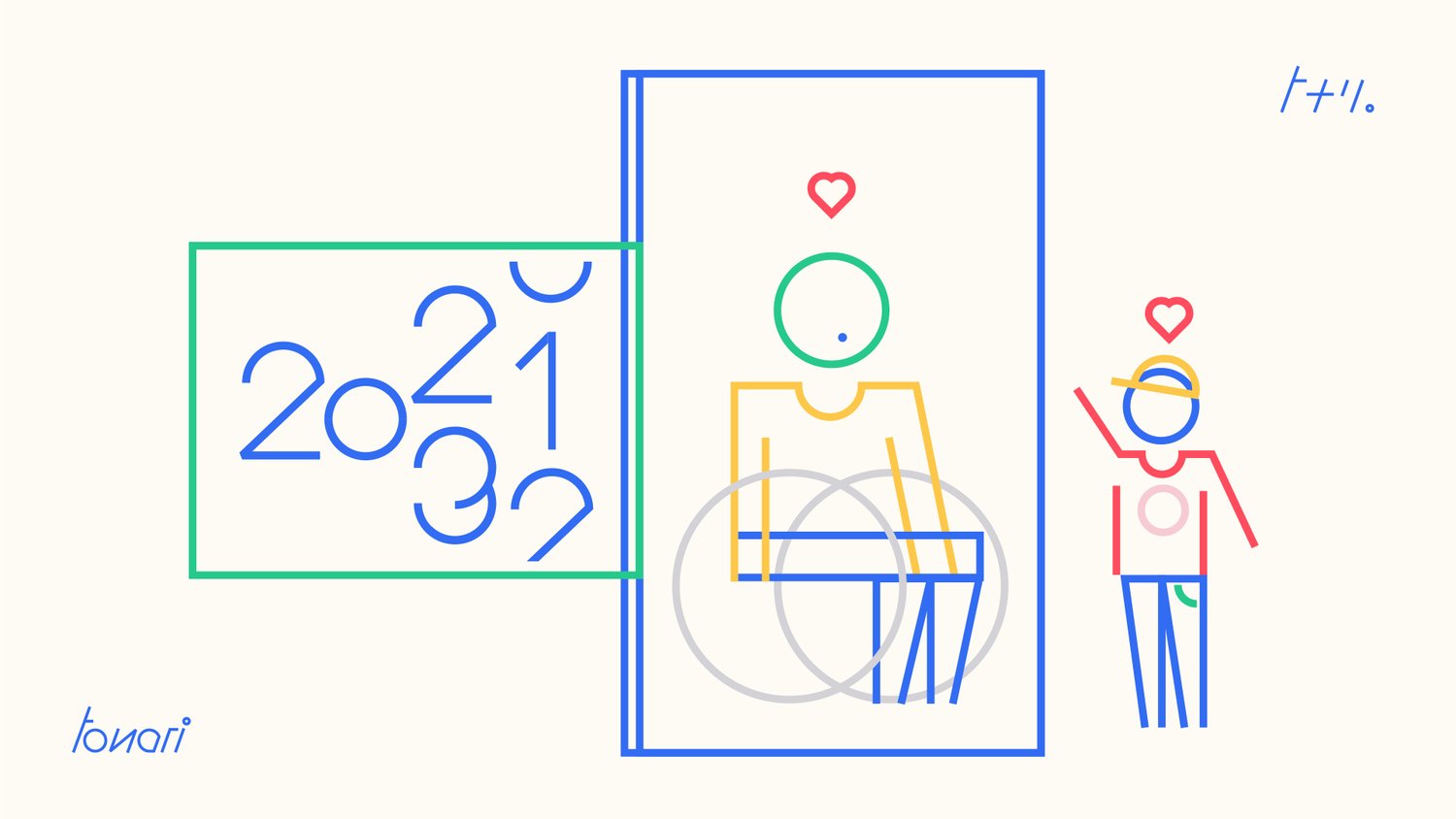Home is not a place, it's a people.
Whether for talent, customers, or suppliers, all companies are distributed.
Great education is both hyperlocal and global, diverse and inclusive.
In our widespread and deeply interwoven society, technology has to play a role in expanding natural human connection. We urgently need to explore and build ways to reduce the heavy environmental costs of air travel, and the time and stress of commuting, to be kinder to ourselves and our planet. We also need ways to increase emotional connectivity — among families, colleagues, or classmates — when we are forced to be physically apart, as so many of us have experienced during this pandemic.

tonari is a unified installation that seamlessly connects two spaces as if you are in the same room. Unlike video calls, it provides an immersive, life-sized experience that brings you face-to-face with true eye contact, complete presence, no lag, and no learning curve.
In businesses and workplaces, it enables distributed teams and management to be flatter, more trusting and collaborative, more time and human-resource efficient, and more environmentally sustainable.
In schools, it enables educational experiences that cross urban, rural, and global cultural divides, expanding access to opportunities and developing greater social consciousness.
In cafes, community spaces, eldercare, and homes, it enables deeper and more intimate relations, and extends our reach to provide greater emotional care for loved ones when physical closeness isn’t an option.

tonari is a 10-year vision and effort that begins with focused technical research and development, advances into product development and operational scaling in early markets, and later achieves economies of scale to produce accessible infrastructure for all people everywhere. In time, we imagine tonari to be no more costly and no less ubiquitous than televisions, mobile phones, or wireless internet services.
To create this future, we established tonari as a social venture with two sibling entities:
- 一般社団法人tonari (the non-profit) is a non-profit institute established in 2017, and funded through a generous grant from the Nippon Foundation. It uses its resources to drive small scale experiments and pilot implementations of tonari, in order to explore opportunities that will be more operationally and economically viable in 2-3 years time. It also takes responsibility for developing and sharing tonari's vision through media activities and self-publication.
- tonari株式会社 (the startup) is a for-profit company established in 2018, and funded through capital investments from Mistletoe, One Capital, and other angel investors. It uses these resources to advance tonari's product developments and operational scaling through commercial activities. It is tasked with accelerating sustainable growth by identifying and serving key markets, establishing manufacturing and commercial partnerships, and reducing costs by steadily advancing hardware and services towards the mass market.
These two entities exist together in purposeful tension. The non-profit has non-commercial rights to joint R&D for the purpose of experiments and research activities, which it can operate independently or in tandem with the startup. The startup has commercial rights to joint R&D in exchange for providing hardware and services for the non-profit's experiments, and for providing financial support to the non-profit through 2027. This sustains the non-profit for 5 years beyond the grant period with the Nippon Foundation.
In the world of technology, much evidence would show that there are few faster ways to build cost-intensive and world-changing tools than through the mechanisms of capitalism and free markets. A for-profit company that can raise capital, establish commercial partnerships, and follow the learnings of some of the most innovative organizations of our time — e.g. Apple, Google, Tesla — is the surest path to rapid development and global scale.
At the same time, tonari must be aligned to its ultimate mission to serve society, and to be accessible and universal. A non-profit institute that can continue experimentation and development for new and underserved markets, and advocate for a more complete vision of the future, will hold tonari accountable to its longer goals. We also believe public research and advocacy can encourage healthy competition in markets where tonari may be slower or less successful.

In November 2020 after 2.5 years of development, we launched our first commercial product for the workplace. We are targeting 10 customers within Japan this year, with an aim to scale to hundreds of units by next year. We're excited by the early success we've seen at Frontier Consulting, and for other soon-to-be-announced relationships we've formed with early customers. Limited international expansion is also more clearly on the horizon.
And with optimism towards the end of this pandemic, the non-profit is resuming experiment and pilot activities this summer after a 1-year hiatus. We plan to launch 3 new pilot implementations with the themes of community, education, and wellness, and hope this work will establish a foundation for commercialising tonari for educational uses in 2022. One of these pilots includes the launch of an experimental public space, accessible to other non-profit communities, slated to soft-open later this spring.

We expect this to be a long journey. It will take many product iterations over multiple years to develop early markets, and to eventually reach a scale where tonari can be accessed by the mass market. We've said before that we see Tesla's journey as a guide for our own: they began with a limited production Roadster, moved onto the luxury Models S and X, and eventually the mass-market Models 3 and Y. Getting tonari's software, hardware, and operations to reach global scale will take much less effort than building cars and gigafactories, and can be done more rapidly with the right partners, but will nonetheless take time and focused effort over the next several years.
In the end, success will be measured against our mission: Build a future to give people more flexibility for where they work, and how they learn and grow, while staying close to family and community. By enabling each of us to be where we want to be, we empower everyone to live and work better, together.
We're in it for the long haul, with infinite gratitude to our team, partners, customers, and community. With early production scaling now underway, we're especially excited for all of the new real-world case studies and stories we will share with you this year.
If you enjoyed this and want to learn more about tonari, please visit our website and follow our progress via our monthly newsletter. And if you have questions, ideas, or words of encouragement, please don't hesitate to reach out at hey@tonari.no. 👋
Find us 💙
Facebook: @heytonari Instagram: @heytonari X: @heytonari
